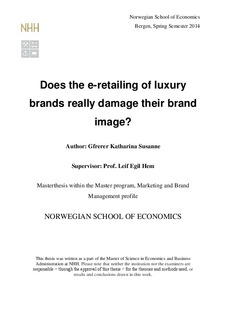| dc.description.abstract | With an increasing focus on e-commerce and the lack of research in the respected area within
the luxury industry the underlying thesis assumes particular relevance. The main concern was
to contribute to existing theory and provide new insights into consumers’ image of luxury
brands practicing e-commerce.
More precisely, the main purpose of this thesis was to find out more about e-commerce in the
luxury industry and to provide a clear overview about the image of luxury brands being sold
online. The main outcome of the theory chapter was that brand identity is an essential concept
in luxury branding, along with brand image and brand equity. In addition, the differences
between traditional branding and luxury branding were highlighted. This provides the
background to better understand, what luxury managers will have to be careful about while
practicing e-commerce.
The paper was split into two parts, firstly to confute arguments against selling luxury brands
online and secondly, to investigate the image of luxury brands selling online. In addition to
secondary research, primary data regarding the latter concern was collected from 192
respondents through a quantitative online-survey.
The results indicate that the general image about luxury brands in an online environment is
neither extremely positive, nor extremely negative. Moreover, unlike previous research, no
further evidence that the image will be diluted once a luxury brand is sold online could be
found. Despite that, most of the arguments against luxury brands selling online could not be
confuted. However, evidence that luxury brands are already selling online exists.
Furthermore, both the underlying research and theory suggest that in luxury branding, brand
identity and the brand image are the most important concepts in this regard.
All in all, both managerial and theoretical implications could be generated. Theoretically, the
underlying thesis adds new insights to the image of luxury brands selling online and gives a
clear overview about the current ‘state of the art’ in luxury branding and e-commerce. In
addition, the following managerial implication on how to integrate e-commerce in a luxury
strategy can be drawn. Provided that the identity is conveyed consistently from the beginning,
e-commerce in luxury can be implemented without problems and proves to be successful. | nb_NO |
